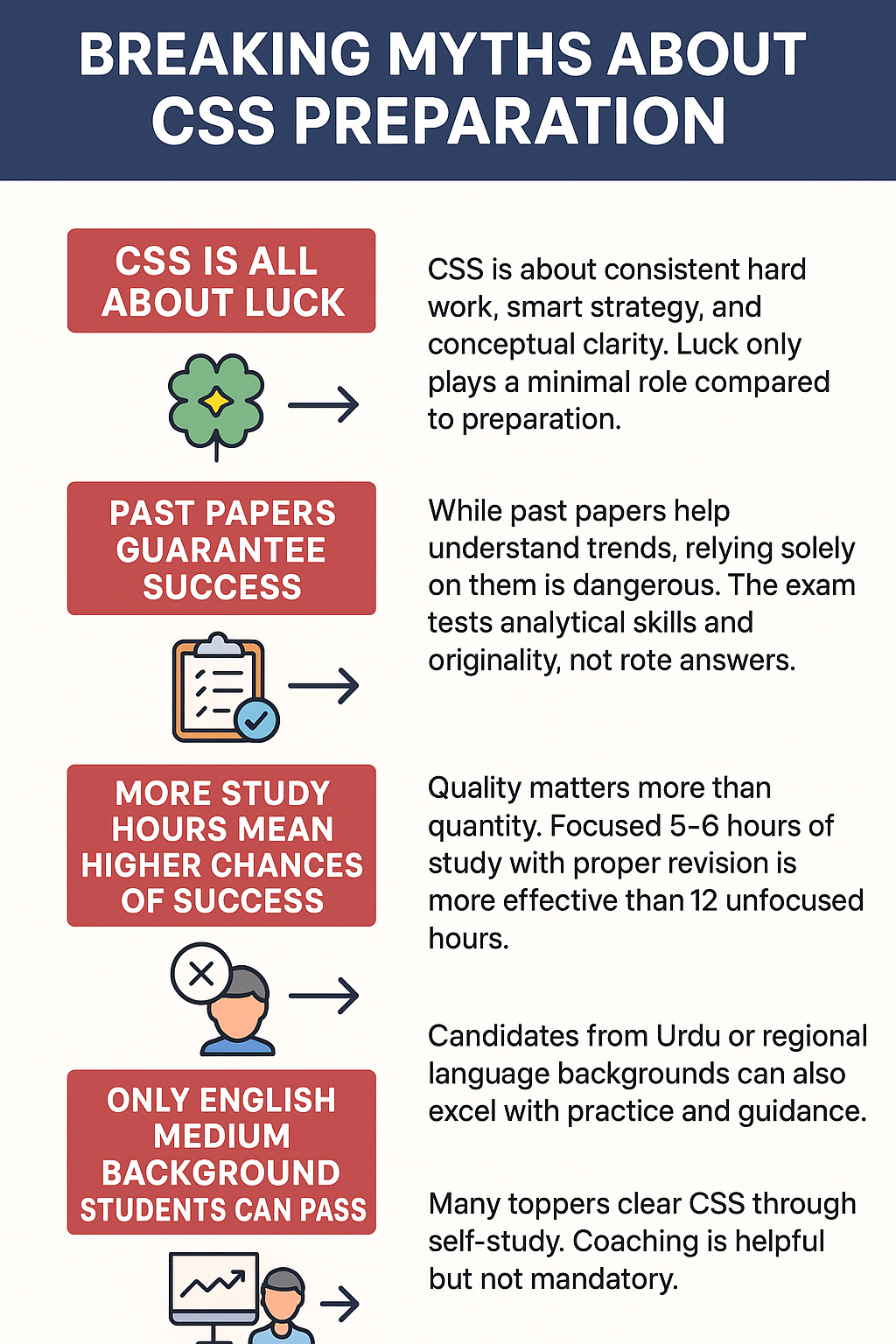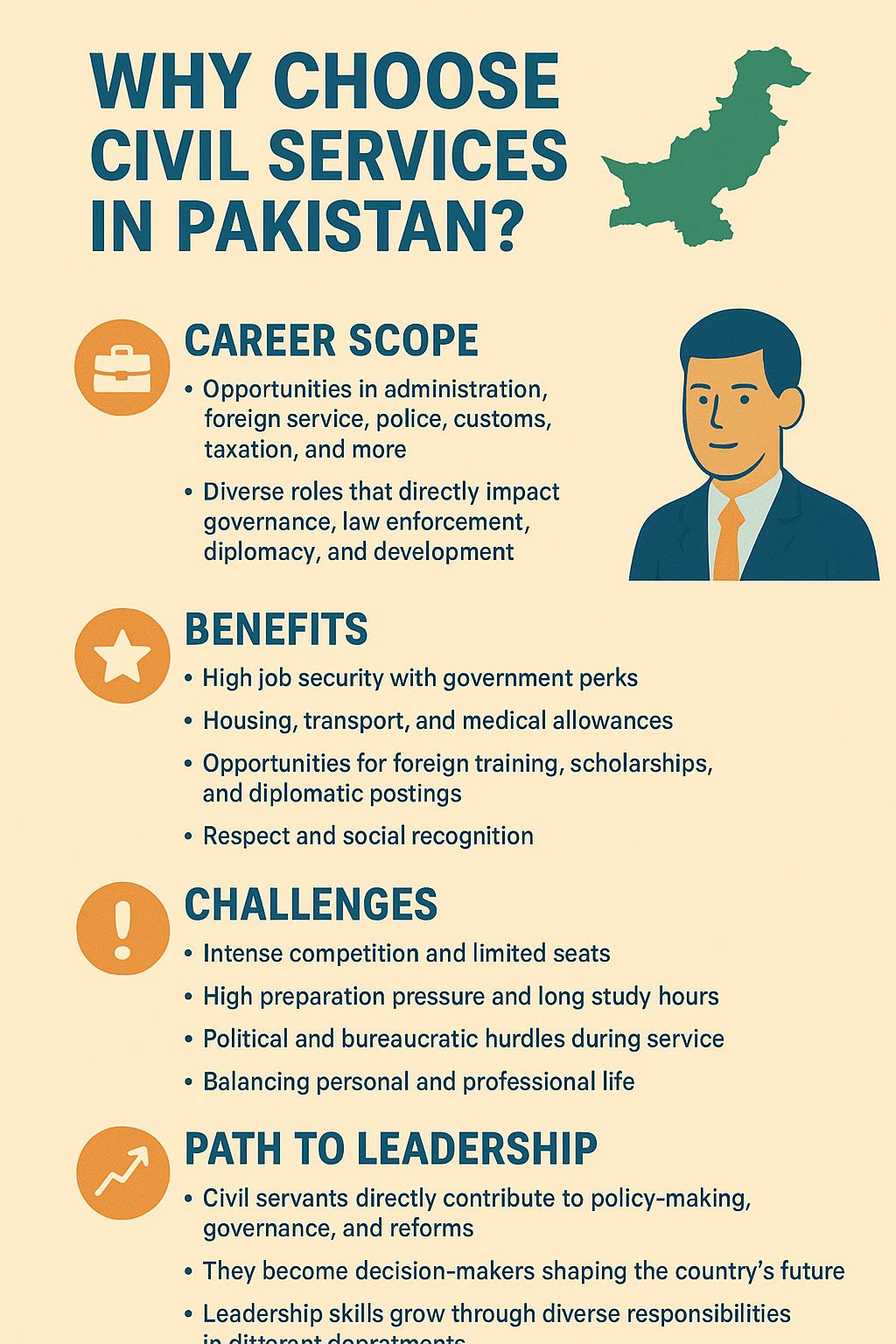The Central Superior Services (CSS) and Provincial Management Services (PMS) exams in Pakistan are surrounded by myths that can discourage or mislead aspirants. These misconceptions, often spread through hearsay or outdated advice, create unnecessary fear and confusion. This article debunks the top 13 myths about CSS and PMS with facts, statistics, and real-world examples, empowering you to approach these exams with confidence for the 2026, 2027, or 2028 cycles.
Myth 1: Only Certain Degrees (IR, Law, English) Are Suitable
A foreign or certain degrees are not a requirement. The Federal Public Service Commission (FPSC) and provincial commissions only mandate a bachelor’s degree (minimum 2nd division for CSS). In 2023, over 80% of CSS qualifiers held degrees from Pakistani universities, such as Punjab University or Quaid-e-Azam University. CSS is open to all disciplines. The key is selecting optional subjects based on interest and scoring trends, not just academic background. Engineers, doctors, and commerce grads regularly qualify.
Myth 2: CSS/PMS Exams Are Only for Geniuses
The exams test discipline, strategy, and hard work, not innate genius. The CSS pass rate is low (2-3% of ~50,000 applicants annually), but this reflects competition, not intellectual exclusivity. Consistent study and practice can make anyone competitive. Reality: CSS success is not about GPA or university rank. It depends on your strategy, consistency, and ability to write well under pressure. Thomas Edison said,
“Genius is 1% inspiration and 99% perspiration.”
Success in CSS/PMS is about persistent effort.
Myth 3: You Must Attend Expensive Academies
Coaching academies can help, but they’re not mandatory. Many toppers, relied on self-study using free resources like Dawn newspaper, past papers from fpsc.gov.pk, and YouTube channels (e.g., CSS Hub). Academies provide structure, but self-discipline can achieve the same results. Reality: Most top scorers self-study or take online guidance.
Digital platforms like CogitaVerse, YouTube, and WhatsApp groups offer better mentorship than many traditional academies.
Myth 4: Only Rich People Can Afford CSS/PMS Prep
Truth: Preparation is affordable with the right approach. Essential resources like Pakistan Affairs by Ikram Rabbani (~PKR 1000) or Dawn subscriptions (~PKR 500/month) are budget-friendly. Free resources, including FPSC past papers and online lectures, make prep accessible.
Allama Iqbal said, “Khudi ko kar buland itna…” (Elevate yourself so high). Your financial status doesn’t define your potential.
Myth 5: English Fluency Is Everything
While English is crucial for the Essay and Precis papers, clarity and structure matter more than native-level fluency. Examiners value coherent arguments and factual accuracy. Every year more than 70% of CSS qualifiers are non-native English speakers who improved through practice. Thousands of Urdu-medium and non-elite background students clear CSS/PMS every year. Many toppers start from scratch and build up using online lectures, newspapers, and grammar guides. The key is strong concepts and improving English gradually through practice.
As Hina Rabbani Khar, a former CSS officer, said, “Clarity of thought is the key to effective communication.”
Myth 6: CSS/PMS Is Only for Young Graduates
The CSS age limit is 21-30 (32 for some categories), and PMS often extends to 35. Many candidates succeed in their late 20s or early 30s, balancing jobs or family responsibilities. In 2022, 45% of CSS qualifiers were over 28, per FPSC data.
Myth 7: You Need to Memorize Everything
CSS/PMS exams test analytical skills, not rote memorization. Questions require critical thinking and application (e.g., analyzing Pakistan’s economic challenges). Understanding concepts and practicing answer writing are key. Conceptual clarity, analysis, and opinion matter more. CSS and PMS test your ability to understand, connect, and express ideas, not just recall facts. Focus on understanding books use past papers to practice analytical responses.
Myth 8: Optional Subjects Don’t Matter Much
Optional subjects (600 marks in CSS) are as crucial as compulsory ones. High-scoring subjects like Sociology or International Relations can boost your rank. In 2022, toppers averaged 75% in optional subjects vs. 60% in compulsory ones. While optional subjects are key, compulsory papers—especially English Essay and Precis—are often the deal-breakers. Focus equally on both sections for a balanced strategy. Choose overlapping subjects (e.g., Political Science with Current Affairs) for efficiency.
Myth 9: CSS/PMS Guarantees a Luxurious Life
Civil services offer stability and respect, but not extravagance. A BS-17 CSS officer earns ~PKR 80,000-100,000 initially, with perks like housing. The real reward is impact, not wealth. The privilege lies in impact, not luxury.
Kofi Annan said, “To serve is not just a duty; it’s a privilege.”
Myth 10: Failing Once Means You’ll Never Succeed
Many toppers failed before succeeding. The CSS/PMS journey tests resilience. In 2023, 40% of qualifiers were repeat candidates, per FPSC reports. Many officers clear CSS/PMS on second or third attempts. Use each attempt as a learning curve, refine your strategy, and adapt.
Imran Khan said, “Never give up on your dreams, no matter how big they are.”
Persistence turns failure into success.
Myth11: “You Must Study 14–16 Hours Daily to Pass”
Many aspirants believe that spending 14 to 16 hours per day studying is the only way to succeed in CSS and PMS exams, but in reality, focused and strategic study for four to six hours a day—with regular short breaks and active revision—is far more effective for long‑term retention and prevents burnout. Research in educational psychology shows that studying in shorter, concentrated intervals enhances memory consolidation, and numerous high achievers have proved that smart scheduling, review sessions, and consistent effort outperform marathon study sessions.
Myth12: “Past Papers Aren’t That Useful”
Contrary to the myth that past exam papers have limited value, systematic review and practice of ten to fifteen years of past papers allows aspirants to identify recurring topics, understand the examiners’ expectations, and develop effective time‑management skills under timed conditions, making past-paper practice an indispensable component of a successful preparation strategy.
Myth13: “CSS is About Luck”
While luck can influence small aspects of any exam, CSS success is overwhelmingly determined by deliberate planning, consistent preparation, and disciplined execution; candidates who follow structured mock schedules, analyze their weaknesses, and refine their techniques through repeated practice are the ones who achieve top ranks, demonstrating that achievement is rooted in effort and strategy rather than chance.
Conclusion: Approach CSS/PMS with Clarity
The CSS and PMS exams are challenging but achievable with the right mindset and preparation. Don’t let myths deter you. As Quaid-e-Azam said, “Work, work, and more work is the key to success.” Use this busted-myth guide to fuel your journey for 2026, 2027, or 2028. Start today, stay focused, and join the ranks of Pakistan’s change-makers! Believing in myths can derail your preparation. Instead:
- Trust real data and real mentors
- Avoid negativity from non-serious aspirants
- Build your own journey with proper planning
“Separate the noise from the signal. CSS isn’t a gamble. It’s a calculated mission.”
Proudly Powered By



